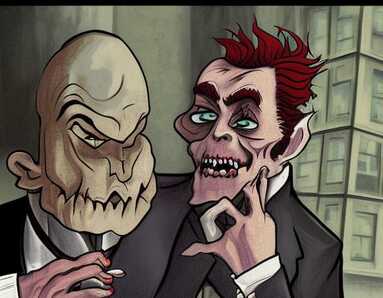 Jungian shadow work is frequently criticized for its lack of empirical scientific evidence supporting its fundamental concepts. The notion of an unconscious "shadow self" housing repressed elements of one's personality is widely regarded as unverifiable and speculative within the realm of psychology, casting doubts on the validity and credibility of this approach. From this perspective, Jungian shadow work is seen as potentially encouraging scapegoating and projection rather than fostering genuine self-awareness and responsibility. Critics argue that by attributing negative behaviors to an abstract "shadow self," individuals may avoid taking responsibility for their actions. It is no longer our fault it is: repressive culture/religion that "made me behave when I didn't want to". The shadow is simply a whine when we haven't gotten our way. There is no greater example of this than the already used Dr. Jekyll and Mr. Hyde by Robert Louis Stevenson. Why? There is no Mr. Hyde. Edward Hyde is not a distinct personality coexisting within the same body as Henry Jekyll. "Hyde" is merely a physically altered form of Jekyll, a transformation that renders his body unrecognizable while he indulges in undisclosed urges deemed unacceptable for a man of his age and social status in Victorian London—likely a combination of violence and sexuality, with specific mentions of torture. It allows Jekyll to be the cruel person he wants to be, while Hyde takes all the consequences. It's crucial to note that it's Doctor Jekyll and Mister Hyde. Jekyll is a respected professor, while Hyde is a lower-class commoner. Hyde is also considerably younger than Jekyll. Both of these facts enable Jekyll, when assuming the persona of Hyde, to engage in far more reprehensible behavior. The Doctor cannot concede anyone better than himself, otherwise Hyde, if he is his repressed desires, would be PROFESSOR Hyde. Significantly, we are never privy to Hyde's perspective because it doesn't exist. Even when outwardly appearing as Hyde, Jekyll always perceives himself as Jekyll. In his testament, which concludes "The Strange Case of Dr. Jekyll and Mr. Hyde," Jekyll consistently employs "I" statements when describing his time in Hyde's guise: "I looked in the mirror and saw Hyde," "the pleasures I sought in my disguise," "I awoke to see I had the hand of Hyde." Even when recounting murder, Hyde's most heinous act, Jekyll says, "I mauled the unresisting body," followed by "I saw my life to be forfeit." In essence, he takes responsibility for the murder and the pleasure it brought him, all while maintaining a very Jekyll-like fear of losing his esteemed life. He remains Jekyll, regardless of his appearance or behavior. Further to this, the novel shows us that Jekyll changed his will to have Edward Hyde be the sole beneficiary after his death OR disappearance, implicating that Jekyll was creating another identity to escape into. One source of the story's misinterpretation is Jekyll himself referring to Hyde as a separate entity, one with desires and concerns entirely distinct from Jekyll's own. Jekyll contends that while he may desire to commit Hyde's sins, Hyde doesn't care about the friends, respect, wealth, or love that Jekyll values. He is projecting his crimes ONTO Hyde to draw attention away from himself. However, Jekyll is an exceedingly unreliable narrator in this regard, as his own account contradicts this assertion. This contradiction isn't limited to instances when he recalls his time disguised as Hyde and still identifies as Jekyll, but extends to "Henry Jekyll's Full Statement of the Case," which Jekyll pens (and their writing is in exactly the same style and not differently if we are to believe they are separate personalities) while trapped in Hyde's body. If there were ever a moment for Hyde to assert himself, to express his autonomy, it would be then. But he doesn't. Because he can't. Because he doesn't exist. The fundamental error made by most versions of Jekyll and Hyde is a failure to comprehend that Jekyll desires to engage in all the activities he pursues as Hyde. He relishes being Hyde, reveling in the freedom it affords, and only considers his dual personality a problem when its consequences catch up with him. This fundamental misunderstanding leads to further misconceptions. First, Jekyll is not inherently good. He is a criminal who has created an elaborate public image to HIDE (Hyde) his violent and sexual urges. His primary motivation lies in his desire to evade consequences for his actions. Second, Hyde is not an accidental byproduct of an unrelated experiment. Hyde is precisely the intended outcome of Jekyll's experiment. Hyde represents Jekyll's reward, not his punishment for playing God. Third, Jekyll is not unaware or out of control when he assumes the identity of Hyde. He chooses to take the elixir and unleash Hyde, creating a scapegoat he can project on. In reality, it is akin to using a phonebooth and changing into a costume; He retains perfect recollection of his actions as Hyde because he remains in control throughout. His problems compound when the elixir stops working and he begins to transform without it. He cannot assume this new life if he transforms on a whim. What if he gets captured? Hyde turning into Jekyll reveals that it was Jekyll the whole time. Jekyll's inability to sustain the transformation is what springs him into suicide. He MUST preserve the appearance of being an educated and innocent man of science! Its NOT his fault, it is entirely the fault of Hyde and he has slain the beast! Good, good Jekyll. The story of Jekyll and Hyde offers a more nuanced exploration of the nature of evil, society, shame, and repression than other works of its time and even after. It delves into the complexities of human desire, the attraction to indulgence, and the fear of consequences. The notion of evil as an external force is removed from the accountability of Jekyll. Hyde is not a separate entity committing sins on Jekyll's behalf; he does not exist. Jekyll alone is responsible for all of his transgressions, challenging us to reflect on the nature of our own desires and the consequences of our actions. The same can be said of Shadow Work. With Shadow Work almost all of our perceived negative behavior is all due to a repressed consciousness that, if we want to get better, we have to placate in some way. These hidden motivations are often attributed to some negative view of socialization, where the human animal was made to walk upright and not fling its excrement everywhere and because of this became a resentful wolf in sheeps clothing instead. The concept the shadow is framed as "an internal entity taking control of my choices without my consent" is overly simplistic, dissociative, and lacks responsibility. This mirrors the error made by Jekyll himself. Hyde, the Shadow/Ego isn't a separate individual perpetrating Jekyll's transgressions on his behalf. Hyde is a nonentity; all of Jekyll's transgressions are his own doing. This belief does in fact fly in the face of our sense of right, justice and Moral Foundation Theory. According to moral foundations theory, differences in people's moral concerns can be described in terms of five moral foundations: an individualizing cluster of Care and Fairness, and the group-focused binding cluster of Loyalty, Authority and Sanctity. An interesting theory that has been proposed is that politically left and right leaning people do not have the same Moral Foundations spectrum. Research on moral foundations suggests that liberals prioritize moral values linked to individual rights, such as harm and fairness. In contrast, conservatives place importance on these foundations while also valuing group rights like loyalty, authority, and purity (purity being a concept that is seemingly difficult to grasp or enforce). Liberals tended to exhibit greater endorsement of Individualizing foundations (specifically, Harm and Fairness foundations) when the target group was an outgroup. On the other hand, conservatives displayed stronger support for Binding foundations (encompassing Loyalty, Authority, and Purity foundations) when the target group was an ingroup. How does this fit in with The Shadow? Those who do not have a firm grasp of all the moral foundations might come to the conclusion that they are being repressed, and seek ways to avoid being held accountable to a system of beliefs they do not understand and therefore find constraining. They do indeed Hyde, compartmentalizing themselves so as to avoid responsibility and consequence they do not understand and fear. The Shadow concept is useful to these types of people because it is no longer their fault (and this is not victim blaming), its a forceful and diametrically opposed system/other's fault. What was done to them is "monstrous", and that is why they acted like monsters. That is patently false and serves to protect their pristine versions of themselves. There is an inversion to the concept of the Shadow, and I could only ever really accept the concept if the following is true. Jungian and Freudian theory tends to view the human animal as starting from a state of degeneracy. And while I can agree that we are in a religious sense "fallen", this is not alone our starting point. While we are not wholly evil, this also means that there is a core of us that is good. Not solely good, but intrinsically there. I call this the LUMIONOUS PERSONA. In the Luminous Persona, a person's subconscious motivations are rooted in kindness, compassion, and a genuine desire to make the world a better place. They hold benevolent intentions and a sincere wish to help others. However, despite these positive inner motivations, their outward behavior and self-presentation project a negative or even malevolent image to the world. They might appear harsh, critical, or even villainous in their interactions with others. This stark contrast between their inner goodness and their external presentation creates a complex psychological dynamic. Several reasons can contribute to this inversion. It might be a response to past trauma or a fear of vulnerability. The individual may have developed this protective mechanism to maintain control or hide their true selves due to societal expectations or past negative experiences. The trivia master answers incorrectly so that people don't become resentful at their ability to win consistently. They miss basketball shots so that no one feels outmatched. They react to a crying baby with rudeness even though they could sooth the child very well, but they don't want to take the agency of the mother away. They are accused of cheating on a math test, and so to avoid persecution they intentionally get answers wrong. In practice, this inversion can lead to self-sabotage. The person unconsciously undermines their own efforts to do good, often eliciting negative reactions from those around them. This self-fulfilling prophecy perpetuates the dissonance between their intentions and their actions. In this inversion they prefer to be called MISTER even if they hold degrees that would raise that title, or distract from their qualifications and rest on the facts of their claims as opposed to the appeal to authority. in fiction this could be the trope of the Almighty Janitor or the protagonist in Good Will Hunting Living with a Luminous Persona can be psychologically challenging. It creates an ongoing inner conflict between their genuine, positive motivations and the negative image they project. The struggle to reconcile these opposing forces can lead to inner turmoil and a sense of inauthenticity. To resolve this internal conflict and present a more authentic self to the world, individuals with a Luminous Persona may need to engage in deep self-reflection, time away from others, or other forms of validating work. By integrating their positive motivations with their external behavior, they can move towards a more harmonious and genuine way of living. It's important to note that the concept of a "Luminous Persona" or "Positive Shadow" is a hypothetical construct rather than a formal psychological theory. Nonetheless, it serves as a thought-provoking exploration of the intricate nature of human psychology and the dissonance that can exist between our inner selves and our outward presentations.
0 Comments
We all tend to avoid emotional pain. This is not good. It dramatically limits our potential. If we want to have a shot at actualizing our potential, we need to “eat our pain” and, rather than curl up in a little ball and try to avoid it, we should discipline ourselves to digest and gain nutrition from the challenges and pain in our lives.
Think of all your failures as being nutritional building blocks. On their own, they may not seem to do much or even taste bitter. Calcium is good for your bones, but broccoli isn’t everyone’s favorite vegetable. And vitamin D is good for boosting your mood, but foods such as liver gross many people out. Yet when you interlock them the vitamin D increases your calcium absorption, and calcium can also stabilize your mood. We know that calcium and vitamin D are essential for our health, but we often avoid them because foods rich in vitamins and minerals tend to be not very flavorful or “painful” to eat. Yet growth itself is a painful process, and if we avoid learning from our failures because of pain and pallet then we become unhealthy even when our bellies are full. Use what you learned from your failure to build on top of. Interlock those lessons. Your failure allowed you to see what worked and what didn’t, what shapes fit together, and what you want to build towards. Avoiding something because it is painful both emotionally and spiritually, prevents you from growing in the way you need to. Most of us are aware that pain is an inevitable part of life. We also know deep down that using pain to grow is a far better option than simply avoiding it altogether. Unfortunately, we often fall into the trap of trying to find short-term solutions for long-term problems, which in the end can do more harm than good. When we use pain to grow, we’re taking a step in the right direction by pushing ourselves beyond our comfort zone. We become more resilient, have more courage and expand our capacity for success. Rather than cowering away from our struggles, we face them head on and come out stronger on the other side. It’s important to understand that using pain to grow doesn’t mean you have to enjoy it or even like it. It means having the courage and fortitude to use it as fuel for future accomplishments. You need to remain positive and focus on what lies ahead rather than getting discouraged by what’s happening now. Here are some ideas for how you can use pain to your advantage: • Embrace failure – Embracing failure is one of the most difficult things for many people but it’s also one of the best ways to learn and grow from experiences. When you make mistakes, don’t get discouraged; instead take those lessons with you and channel your energy into finding solutions or making improvements • Have a tonality – Having a positive tonality in everything that you do will help instill confidence and resilience in yourself when faced with difficult circumstances or roadblocks in life. A positive attitude will help you work through any challenge with ease as well as helping you stay motivated when times get tough • Celebrate small wins – Celebrating small wins along your journey will give you motivation and keep you inspired while on your path towards growth and success. Every accomplishment should be celebrated no matter how small; recognizing these successes will give you fuel for future progress The key takeaway here is that pain is an unavoidable part of life and if we want to reach our full potential, then we must learn how to use it as a tool for growth instead of running away from it or trying to suppress it. With this mindset, you’ll soon find yourself developing greater strength, resilience and a higher tolerance for adversity—all essential traits needed on the road towards success! Be Willing to Change. In order to become a better person, you have to be willing to change...If you are willing to change and think differently, you can become a better version of yourself. It is all about having the right attitude, being open to new ideas, and thinking outside the box. If you are willing to embrace change, it can lead to positive outcomes in your life. Tonality plays an important role in persuasion. It is not just about the words that you use but also how you say it. If your tonality is too begrudging or negative, people may not be receptive to what you are saying. On the other hand, if you have a positive and optimistic tonality when communicating your thoughts and ideas, people will be more likely to listen and respond positively. The key is to find a balance between being assertive and conveying your thoughts with positivity. You want to be sure that your tonality reflects both your passion for the subject matter and respect for those who disagree with you. This will make it easier for others to understand where you’re coming from and why they should consider your point of view. It is important to remember that tonality is not just about speaking; it’s also about writing as well. The way that you write can have an impact on how people interpret what you’re saying as well as their overall opinion of you. Therefore, when writing emails or blog posts, try to keep your tone upbeat and positive while still making sure that your points are clear and concise.
Stop Making Excuses... Gratitude is the cousin of joy. Focusing on what we do have makes a difference. Joy is not found in the material world. It is a mindset.When we focus on the things that bring us joy, our minds become more open to the possibilities of life. This shift in mindset is one of the first steps to achieving a state of gratitude. Gratitude can be seen as the cousin of joy because it helps us to appreciate and take notice of all the wonderful things that are already in our lives. Gratitude allows us to appreciate what we do have and not focus on what we don’t have. It helps us to recognize the small moments of joy and contentment throughout our day and savor them for what they are. We all know that material possessions will not bring true lasting happiness, rather an awareness and appreciation for what we do have can help us find true joy. When we learn to practice gratitude, it can help us to curb any feelings of envy or discontentment that may arise when we compare ourselves with others or focus on things that are out of our control. Instead, when we take time each day to reflect on what we are thankful for, no matter how small or insignificant, it can help us cultivate a sense of inner peace and contentment within ourselves. Gratitude is an important part of cultivating a positive mindset which is essential in order for us to be truly happy. When we focus on the many blessings in our lives, our minds become more open to joy and abundance and this is when tonality becomes persuasive. Our thoughts determine how we feel about ourselves and our circumstances so it is important that we make sure these thoughts are positive ones and fill our minds with gratitude for all that life has given us.
It is a fact that our thoughts shape our lives and the way we perceive the world around us. This is why it is so important to start your day off with a positive mindset and outlook on life. As we all know, the morning sets the tone for the rest of our day, so why not make sure you start off with the right food? Food for thought!
One way to do this is by engaging in what is known as the #MindCannibalismParadigm. This means that each morning, instead of dwelling on negative thoughts and feelings, focus on one small positive thought or idea that can help you get through the day, and consume it. By doing this, you will be able to shift your mindset from one of pessimism and negativity to one of optimism and positivity. These positive thoughts can range from simply being grateful for the small things in life, such as having a warm cup of coffee or being thankful for a great night’s sleep, to more ambitious goals like achieving success in your career or relationships. Whatever it may be, take time out of your morning routine to focus on something that brings you joy and makes you feel hopeful about the future. The power of positive thinking should never be underestimated. Just one small thought in the morning can have a tremendous impact on how you go about your day - whether it's at work, school, or home - so use this paradigm to make sure you always start off in a good mood! You are what you eat, SO EAT YOUR POSITIVE THOUGHTS |
Judas X. MachinaA little advice that keeps the belly of darkness quiet. ArchivesCategories |




 RSS Feed
RSS Feed
